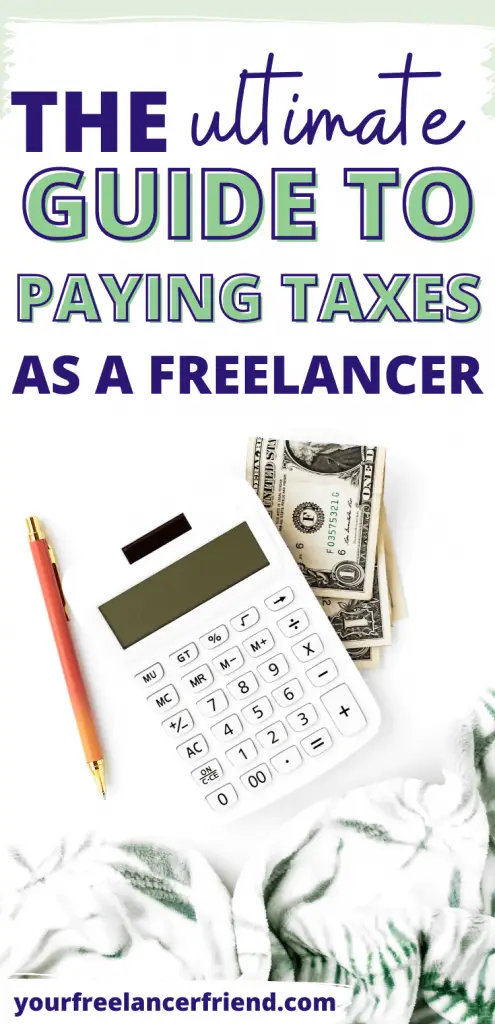It’s tax season in the U.S.A! Time to reconcile with Uncle Sam and find out whether you owe him taxes (😩) or he owes you a refund (🙌🏼).
While tax time is not cause for celebration for many people, it’s a fact of life (and HUGE STRESSOR) for any American citizen. And if you, like me, are a freelancer, things just got ten times more stressful.
Below is every question I ever had as a freelancer about taxes, and the answers I’ve discovered along the way.
**Disclaimer** I am a freelance writer—not a tax professional, so the following is not tax or financial advice. Please seek the advice of an accountant or other qualified professional when doing your bookkeeping and taxes.

First off, what are taxes?
Stick with me here—you need to read this. The reason we need to start here is that most people misunderstand taxes and therefore miss the point of everything else. There are many kinds of taxes—property tax, sales tax, etc.,—but the taxes we’re talking about here are income taxes.
Why do Americans have to file an income tax return every April 15th? Because the government needs taxes to help it run. As citizens/residents of the U.S., we have to contribute to its welfare (literally and metaphorically). The way we do that is, if we’re employees, through having portions of our paychecks taken out and paid to Social Security, Medicare, etc.
At the end of the tax year (January through April of the following year), we “check in” with the government and do a reconciliation, basically saying, “Hey, U.S. government, did I pay enough in taxes throughout last year, or do I still owe you some?”
- If we pay enough in taxes, we will owe nothing on April 15th.
- If we pay too little in taxes, we will owe a tax bill on April 15th.
- If we pay too much in taxes, we will get a refund on April 15th. That’s why it’s so ridiculous when people get excited about winning “free money” via tax refunds—that’s your money that you essentially gave on loan to the government with zero interest!
How do freelancers pay taxes?
Freelancers pay taxes differently than employees. Employees get paychecks, usually every two weeks, from their employer, and their taxes owed to the government are automatically deducted from their salary before they receive their paycheck. Easy! Employees don’t have to figure out taxes themselves.
But because freelancers are self-employed independent contractors, we do not get taxes deducted from our client payments. That means it’s our responsibility to calculate and submit taxes on our earned income; the IRS requires that we freelancers do this through quarterly estimated taxes.
What are quarterly estimated taxes?
Once every roughly three months, self-employed people must submit a payment of their quarterly estimated taxes to the IRS (and to their state tax authority if they live in a state with income tax). For federal taxes, the quarterly estimated due dates are as follows:
- April 15
- June 15
- September 15
- January 15
These quarterly taxes are the equivalent of what employees get taken out of their paychecks; it’s just that we have to do it ourselves every quarter.
At the end of the tax year by Tax Day (April 15th, give or take), we must file an income tax return, which essentially is just us trying to figure out if we paid enough in quarterly estimated payments throughout the year. If we didn’t pay enough (such as if we estimated incorrectly), we will owe taxes by April 15th (and possibly even penalties).
How much should I set money aside for taxes as a freelancer?
This can be complicated because, without the help of a tax professional, you’re really just guessing. It’s generally accepted as a safe rule that you should set aside 25% of your income as a freelancer to pay your taxes. If you have an accountant, they should be able to help you estimate your quarterly payments.
This number varies depending on your situation, though. A few factors that could change how much taxes you owe:
- How much money you make. The U.S. income tax is progressive, meaning you get taxed at a higher rate as you move up the income brackets.
- How many deductions you take. Some freelancers spend more money on their business than others. The more qualified business expenses you have, the more tax deductions you will have. But there are more tax deductions outside of business expenses that you might be able to take, such as if you contribute to a Health Savings Account.
- Whether you live in a state with income tax. If you live in one of the 43 states that has income tax, not only do you pay federal taxes to the IRS, but you also pay state taxes to your state tax authority. You must remember this when you calculate how much money to set aside.
HOW should I set aside my money for taxes?
Ah, this one is trickier. Okay, so ideally, you should have the following business accounts:
- Personal checking account
- Personal savings account
- SEPARATE business checking account
ALL of your client payments should go into your SEPARATE business checking account. Once that money lands there, THEN you can pay yourself by transferring from your business account to your personal account.
Let’s say 75% of every client payment should go to your personal checking, and 25% should go to personal savings. Of course, you should leave some money in your business checking account at all times, enough to cover your regular business expenses.
How do I pay quarterly taxes?
There are MANY ways to pay the IRS, including by phone and in-person. But here are the two most common ways:
- Snail mail
Via snail mail with estimated tax payment vouchers. Your accountant can help you calculate your payments and fill out the vouchers. You then pop them in the mail with a check or money order. - Online
There are currently five ways to pay the IRS online, but I recommend using IRS Direct Pay.
Oops! What if I didn’t pay any estimated taxes last year?
If you didn’t pay any estimated taxes last year, you will have to pay those taxes come April 15th (Tax Day), plus a penalty for paying late.
Can I keep the money I set aside for taxes in my PERSONAL savings account?
Yes, this is perfectly legal and fine. Why? Because if you are a sole proprietor (which almost every freelancer is), then technically, you are paying taxes on your freelance income on your PERSONAL income tax return (IRS Form 1040).
What if I owe back taxes?
Don’t fret! Even if you owe back taxes, you can work with a qualified tax professional like a CPA to make sure you get caught up.
What if I can’t afford to pay my taxes?
This has happened to me multiple times as a freelancer. If you can’t afford to pay your taxes, you should still file an income tax return by April 15th (it’s the law!). File your income tax return, and pay as much of your tax bill as you can. Then, you can work out a payment plan with the IRS. The reason you should still pay as much of the tax bill as you can is that you will be penalized and have to pay interest; so you want to pay interest on as small of an amount as possible.
What are 1099s?
1099s are tax forms that get sent to independent contractors from the clients who contracted them. Technically speaking, the IRS requires 1099s get sent only to independent contractors who were paid $600 or more in a tax year and were paid via cash or check. Regardless, some clients still choose to send a 1099 to all independent contractors they worked with, even if it’s not required.
1099s must be reported on your income tax return.
What if my client didn’t send me a 1099?
Even if a client did not send you a 1099, you still must report ALL income made from that client.
What if my client sent me a 1099, but it has an error on it?
If a client sent you a 1099 with an incorrect amount, you need to ask that client to send you a corrected 1099. Why? Because if a client, for example, says they paid you $2,000 in the 2019 tax year, but they actually paid you $200, and you report the accurate $200 on your income tax return—there will be a discrepancy. The IRS will see a 1099 saying you were paid $2,000, and they’ll see that you only reported $200. So it makes it look like you “hid away” $1,800 and didn’t pay taxes on it. This could trigger an audit.
Do I need to send 1099s?
You are only required to send a 1099 to contractors if:
- You paid them at least $600 in one tax year.
- You paid them via cash, ACH deposit, or check.
You are NOT required to send a 1099 to contractors if:
- You paid them less than $600 in a tax year.
- You paid them via credit card, debit card, PayPal, or other third-party payment platform.
What are some business expenses that I can use as tax deductions?
Some examples include:
- Software, such as a Mailchimp, that you use to do email marketing for your business
- Pens that you bought for your home office
- Online courses that help you learn more about freelancing
- A flight to a conference that helped you learn more about your industry and build your network
I highly recommend checking out CPA Amy Northard’s comprehensive list of business tax deductions.
Do I need to keep a copy of my receipts to take a business expense?
The answer to this is almost always yes. While you could take a tax deduction on your tax return without proof (i.e., a receipt), if you get audited, they could ask you to substantiate that expense.
There are some exceptions to the receipt rule. But I recommend you talk with your tax preparer if you have any questions on deductible expenses and the proof needed.
How can I save my receipts?
It is a hassle keeping paper receipts. Thankfully, with technology these days, it’s easy to keep digital records. Most of my business expenses involve digital receipts (I get an email of the invoice). But for paper receipts, I simply snap a photo of it on my iPhone and upload the photo of the receipt to my Wave bookkeeping software.
Should I have a separate business bank account?
YES. Two things to clarify first, though:
- If you are a sole proprietor (which most freelancers are), you are not required by law to have a separate business bank account. You, technically, can receive client payments into your personal checking account.
- If you are an LLC, you ARE required to have a separate bank account.
Even if you are not an LLC, I believe you should have a separate bank account for your business.
Why? It makes it SO much easier to do your taxes! Because everything will already be separate. You can look at your business bank account and know that every withdrawal was for a business expense or to pay yourself. You don’t have to sift through every transaction and try to figure out, “When I spent $50 at IKEA, was that for my home office, or was that when I was decorating the baby room?”
Do I need bookkeeping/accounting software?
You could keep records of your income and expenses on a piece of paper or in a spreadsheet—but I don’t recommend it. Most businesses use accounting software such as QuickBooks, Xero, Freshbooks, and Wave.
In my nearly seven years of running a freelance business, I’ve used QuickBooks, Xero, and Wave, and I highly recommend using Wave. Wave is FREE to use! And it’s the EASIEST for non-accounting-professionals like me to understand. And even my CPA loves to use it!
What I do now is connect my Wave account to my business bank accounts, and all transactions automatically show up. My CPA is also my bookkeeper, so she goes through and reconciles each transaction, ensuring each is properly categorized.
Whenever I make a business expense, I upload the receipt to Wave and match it to the transaction.
If I spend more money on qualified business tax deductions, then I’m saving money, right?!
WRONG. No, spending more money on business expenses when you don’t NEED to is not “saving money.” Why? Well, when you take a tax deduction for a qualifying business expense, it’s not a one-to-one savings ratio. If you spend $100 on an online course for your business, you don’t save $100 on taxes. It doesn’t work that way!
Definitely check out accountant Eric Nisall’s explanation: Spending Money to Save on Taxes Is Dumb. As Nisall points out, at most, you’ll “save” 20 cents for every $1 you spend on a business expense. So only spend money on your business if you NEED to!
Can I do my own taxes as a freelancer?
Yes, but there are many reasons why I wouldn’t recommend it. To be clear, there is NO LAW that requires you to hire anyone to do your taxes. You can do your taxes on your own by hand or by using software such as TurboTax.
BUT because self-employed tax returns are more complicated than employee tax returns, I don’t recommend trying to do it on your own. You could miss a lot of things.
Should I use TurboTax as a freelancer?
I wouldn’t. For example, one year, I tried to do my own tax return on TurboTax. I then hired a CPA to review my work—and she found a glaring error. I had failed to take a deduction for my health insurance premiums. For some reason, TurboTax didn’t tell me I was eligible for that deduction. And because I’m not a tax professional, I didn’t know. My CPA ended up saving me hundreds of dollars!
Should I use H&R Block or a similar service if I’m a freelancer?
I think going to a tax professional at a big chain like H&R Block is better than doing it on your own—but I still wouldn’t recommend it. I highly recommend working with an accountant who specializes in freelancers.
How can I find an accountant who works with freelancers?
I’ve written an entire post about that! Check out How to Find an Accountant for Your Freelance Business.
What do I need to give to my accountant to prepare my income tax return?
Generally, your accountant will need:
- All of your 1099s
- Any W2s you may have (some freelancers have part-time jobs)
- Information about you: Are you married or single? Will you be filing separately or jointly?
- How much you paid for health insurance in the past tax year
- Your prior year’s tax return
- Your address
- Your social security number and EIN (if you have one)
- Access to your bookkeeping software
- A list of all your business expenses
It’s almost April 15th, and I won’t be ready to file a tax return on time. What can I do?
File for an extension! This will give you six extra months (until October 15th) to finish your tax return. The trick is, you still have to pay your tax bill on April 15th.
I know what you’re thinking; HOW can I pay my tax bill when I haven’t even finished my return to know how much I owe (if any)? That’s the rub. The best you can do is estimate how much you think you’ll owe and pay that to the IRS. If you overestimate, you’ll get a refund when you file your tax return by October 15th. If you underestimate, you’ll pay the rest by October 15th, along with interest and maybe a penalty.
Oh my gosh, I’m so overwhelmed! Where do I start?
- Breathe! It’s going to be okay.
- Create a FREE Wave account.
- Connect your business bank accounts to Wave.
- Go through all your emails and your wallet and collect all receipts for business expenses.
- Check your mailbox and your inbox for 1099s and W2s.
- Start reaching out to potential accountants.
- Once you find an accountant, schedule a consultation with them and explain your situation. They can give you qualified, professional advice!
PRO TIP: Do all of this as early as possible. As soon as March rolls around, most tax professionals are super busy and may not be able to work with you until AFTER the tax deadline.














Add comment